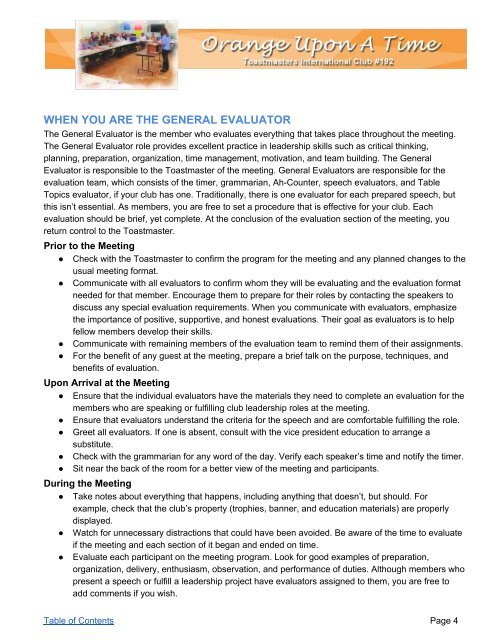Draft - Club Meeting Roles
E-Book documenting club meeting roles.
E-Book documenting club meeting roles.
You also want an ePaper? Increase the reach of your titles
YUMPU automatically turns print PDFs into web optimized ePapers that Google loves.
WHEN YOU ARE THE GENERAL EVALUATOR<br />
The General Evaluator is the member who evaluates everything that takes place throughout the meeting.<br />
The General Evaluator role provides excellent practice in leadership skills such as critical thinking,<br />
planning, preparation, organization, time management, motivation, and team building. The General<br />
Evaluator is responsible to the Toastmaster of the meeting. General Evaluators are responsible for the<br />
evaluation team, which consists of the timer, grammarian, Ah-Counter, speech evaluators, and Table<br />
Topics evaluator, if your club has one. Traditionally, there is one evaluator for each prepared speech, but<br />
this isn’t essential. As members, you are free to set a procedure that is effective for your club. Each<br />
evaluation should be brief, yet complete. At the conclusion of the evaluation section of the meeting, you<br />
return control to the Toastmaster.<br />
Prior to the <strong>Meeting</strong><br />
● Check with the Toastmaster to confirm the program for the meeting and any planned changes to the<br />
usual meeting format.<br />
● Communicate with all evaluators to confirm whom they will be evaluating and the evaluation format<br />
needed for that member. Encourage them to prepare for their roles by contacting the speakers to<br />
discuss any special evaluation requirements. When you communicate with evaluators, emphasize<br />
the importance of positive, supportive, and honest evaluations. Their goal as evaluators is to help<br />
fellow members develop their skills.<br />
● Communicate with remaining members of the evaluation team to remind them of their assignments.<br />
● For the benefit of any guest at the meeting, prepare a brief talk on the purpose, techniques, and<br />
benefits of evaluation.<br />
Upon Arrival at the <strong>Meeting</strong><br />
● Ensure that the individual evaluators have the materials they need to complete an evaluation for the<br />
members who are speaking or fulfilling club leadership roles at the meeting.<br />
● Ensure that evaluators understand the criteria for the speech and are comfortable fulfilling the role.<br />
● Greet all evaluators. If one is absent, consult with the vice president education to arrange a<br />
substitute.<br />
● Check with the grammarian for any word of the day. Verify each speaker’s time and notify the timer.<br />
● Sit near the back of the room for a better view of the meeting and participants.<br />
During the <strong>Meeting</strong><br />
● Take notes about everything that happens, including anything that doesn’t, but should. For<br />
example, check that the club’s property (trophies, banner, and education materials) are properly<br />
displayed.<br />
● Watch for unnecessary distractions that could have been avoided. Be aware of the time to evaluate<br />
if the meeting and each section of it began and ended on time.<br />
● Evaluate each participant on the meeting program. Look for good examples of preparation,<br />
organization, delivery, enthusiasm, observation, and performance of duties. Although members who<br />
present a speech or fulfill a leadership project have evaluators assigned to them, you are free to<br />
add comments if you wish.<br />
Table of Contents Page 4


